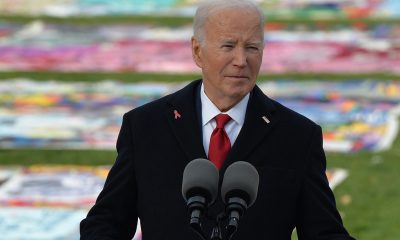Arts & Entertainment
A non-binary Cuban artist is born again in Spain
Nonardo Perea suffered persecution in his homeland
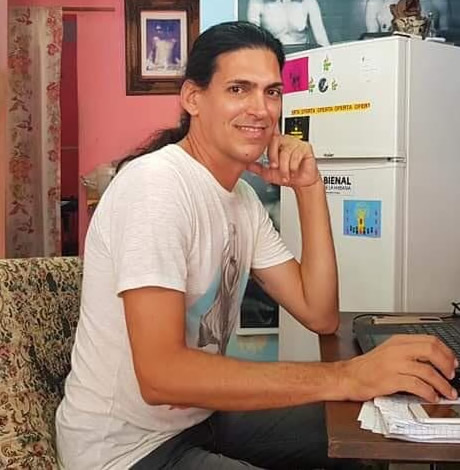
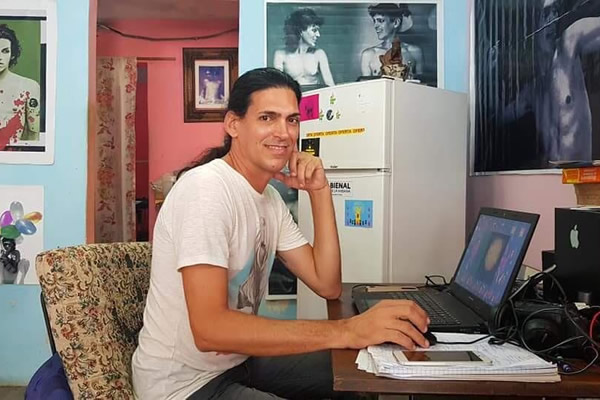
Nonardo Perea lives in Michel’s body. He uses it at will to be vulgar, angelic or diabolical, male or female. Nonardo can be whatever he wants. Michel, shy and withdrawn, hides behinds that alter ego that lends him his face and hands to show the world his claims as an artist.
Nonardo is an invention that comes to life in photographs, video art, performances, stories, installations, journalistic articles, ceramics, and whatever other format is possible, since Nonardo long ago lost any limits. His mind lost that ability as he reinvented himself as an empirical artist, as no one ever gave him the opportunity to attend art school.
He has been greatly misunderstood, mainly because his pieces overflowed with eroticism and Cuba is still too prudish to appreciate his queer art and his other works the regime has labeled as “politically incorrect.” Michel and Nonardo were discriminated against by society and the dictatorship that governs the country and represses anyone who does not agree with its dogmas.
Nonardo nevertheless overcame those barriers and began creating, without anyone’s guidance. He was first a writer and received some tools once he graduated from the Onelio Jorge Cardoso Literary Training Center in Havana. He won several competitions, such as the 2017 Franz Kafka Prize for his work “Los amores ejemplares” and the 2012 Félix Pita Rodríguez Prize for the novel “Donde el diablo puso la mano.”
In the visual arts, where he is usually very restless, he won the third prize for photography at the GendErotica Festival for “La casa por la ventana 2014” with his Vulgarmente Clásica project. He participated in the Bienal 00, organized by independent artists, with his “En la cama con Nonardo” project and presented Vulgarmente Clásica at Madrid’s La Neomudéjar Museum in 2019.
Nonardo belongs to the San Isidro Movement, a group of independent artists and intellectuals who fight for a democratic Cuba. That battle has also been fought through his art and in pursuit of LGBTQ rights, such as marriage and adoption rights for same-sex couples, and an end to gender violence that remains a problem on the island.
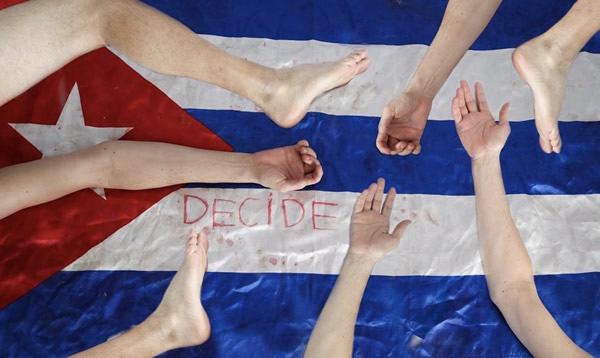
Due to his work and political activism for a truly democratic Cuba, Nonardo suffered police harassment and Cuban state security agents threatened him with jail. Fearing for his life, he took refuge in Spain, a country where he feels he has been reform and from which he speaks with the Washington Blade.
WASHINGTON BLADE: Those who follow your art on social networks and off of them know you as Nonardo, but few know that your real name is Michel. How and why was Nonardo Perea born?
NONARDO PEREA: I remember starting my writing career and I needed another name that was not so common. I did a big search and I didn’t like any of them. I wanted a unique name if possible. One afternoon I was sitting in the living room of my house with my father and I told him about the need for a name. It was he who proposed Nonardo. At first it sounded a bit ugly to me, but then with Perea it seemed a little better. It had strength. I liked it because it began with “no”, denial, and was followed by “nardo”, flower, that is, Nonardo had a lot to do with me. Since then I started using it for all of my work, both literary and audiovisual.
BLADE: How does your artistic training take into account that you are an empirical creator?
PEREA: My artistic creation from the beginning was always very complicated, taking into account that I had to abandon my studies at an early age for inclusion reasons, so I have no academic training; then add to that that I am a very obvious gay. At one point in my teens I was seen as a person who was too feminine. The fact of looking like a woman was a problem when trying to fit in a macho and homophobic society. Where I first tried to break through was in writing. I started by attending literary workshops, where I won several contests quite quickly. I was never exempt from criticism and rejection of the themes that my narrations addressed, which almost always focused on LGBTQ issues and dirty realism. Many times I felt that being the way I am made many uncomfortable. But despite the rejections and bad times that I lived in various periods of my life, I continued doing narrative, and I also began to write articles about social issues for the Havana Times digital newspaper. Then, over time, I had the opportunity to apply to a video journalism workshop in Prague organized by the People in Need organization, and thanks to a woman I love very much, Clara González, who saw some potential in me, I was accepted to participate in the course, in which I learned some video editing, and received help with equipment that helped me to start doing audiovisual work with better quality. All my creative works have been done empirically, and above all I am an artist who works based on improvisation.
BLADE: You have ventured into artistic genres as different as writing, journalism and acting. How do you define yourself as an artist and why?
PEREA: I am a person who cannot be inactive. I spend every day of my life thinking about doing something new. Sometimes I have so many things on my mind, and the fact that I can’t do everything I want to do makes me feel a bit frustrated. I have no words to define myself, I can only say that in some way my creative processes have helped me to cope with the life that I had to live, everything I have done and do has served as a way of escape from reality and everyday life, I could no longer live without creating.
BLADE: In a recent interview you precisely declared that your art was a process of liberating yourself. What exactly do you free yourself from when you create?
PEREA: I free myself from the day-to-day, the everyday, my fears and censorship.
BLADE: In most of your visual works you work with your own image. Why?
PEREA: I use myself as an artistic object because in Cuba I lived in solitude for a long time. I somehow isolated myself and created a space of comfort in my home, a place where I felt more free. The confinement somehow helped me to stay away from society that did not tire of making me feel bad about my obvious homosexual condition in much of my youth. My literary proposals and art in general, on the other hand, were not taken into account. I always perceived that most people underestimated me, and proposing someone to collaborate with me on erotic photographs without receiving anything in return was complicated, and still is. I have control over my body. If I want to undress in a photo or in a video, even if I feel sorry, I strip myself of complexes and do it. If I want to take a photograph that is too vulgar, I also do it. I do not have to request permission from anyone to do so. I don’t put up barriers. I take a risk, then I think that they say what they want. I understand that I am doing a job where I express my personal and social problems, as a human being.
BLADE: You identify yourself as an androgynous person. How many difficulties has that brought you considering that you have lived most of your life and developed your work in Cuba, a country where macho and homophobic ideals still predominate?
PEREA: I consider myself a non-binary androgynous person, because I do not identify with any sex. I can feel at ease as a girl as well as a boy. I have no problem with male or female pronouns. I do not like to victimize myself, but I can tell you that the road has been very difficult, and it has been not only for me, but for many other gays and lesbians who have chosen not to hide their sexual identity in their lives and have had to fight against the world. Being who I am in Cuba has not helped me much in terms of being able to be recognized for my work, but being who I am has helped me to strengthen myself and to understand that I do not need the approval of any institution to continue creating. I am a Cuban artist and like it or not, a large part of my work was created in Cuba.
BLADE: Many Cuban artists prefer to separate their creations from politics and even refuse to give their true judgment on the situation on the island. However, your work has a high dose of activism against the dictatorship and in defense of LGBTQ rights. What consequences, professional and personal, has being an artist labeled by the Cuban regime as “counterrevolutionary” brought you?
PEREA: The main consequence is that I had to go into exile; leave the country where I was born, abandon my mother and family, my friends, my dogs and a lifetime. But I think it had to be that way. There was no other way than to say goodbye, because under no circumstances was I going to allow my creative processes to stop, and above all I was going to continue doing my activism. I know that perhaps I was not going to be able to withstand so much pressure from state security agents, who wanted me to collaborate with them to expose my colleagues from the San Isidro Movement. If I returned to Cuba right now, I don’t know what my life would have been like from that moment on. If being a counterrevolutionary means saying what I think, and being in favor of oppressed minorities, and being against a dictatorship that has left Cuba and its people in a nameless misery for 61 years, then I am a counterrevolutionary and with great honor. I have nothing for which to thank that country, where I was always seen as a freak, and what little I got was thanks to my effort and dedication, because while in Cuba I received criticism and obstacles for everything, for this reason they are collecting what they sowed with me, they do not expect roses from me.
BLADE: In Cuba, to be accepted as part of the official LGBTQ movement you have to share the ideology of the dictatorship, the same one that put equal marriage to a popular vote and represses independent activists. In your opinion, what are the dangers of “politicizing” the struggle of the Cuban gay movement?
PEREA: The danger is in seeing how it becomes politicized. While in Cuba, I never stopped going to the marches staged by CENESEX (the National Center for Sexual Education) and I will not forget how Mariela Castro (CENESEX’s director and the daughter of former Cuban President Raúl Castro) herself politicized those mini-carnival marches with slogans in favor of the five spies imprisoned in the Empire (a reference to the U.S.), and with cries of “socialism yes and homophobia no.” I do not remember seeing any gay or lesbian carrying a sign demanding equal marriage, or demanding freedoms, or a law against gender violence. It is really pathetic considering that the system itself is the number one cause of the persistence of homophobia and constant abuse of people from the community, mainly transgender people, in Cuba, a country where your rights are constantly violated, either because of race or sexual orientation. Those marches were politicized by CENESEX itself in favor of a supposed socialism, which has never worked and will never work because that is a hybrid between communism and underdeveloped capitalism, and we all know that it is nothing other than a dictatorship, and of the crudest in history because it has managed to last for 61 years. If Mariela Castro and all her loyal followers politicize the march for their benefit, I don’t see why the community cannot independently arm its own fight in favor of the most basic rights of the LGBTQ community in Cuba.
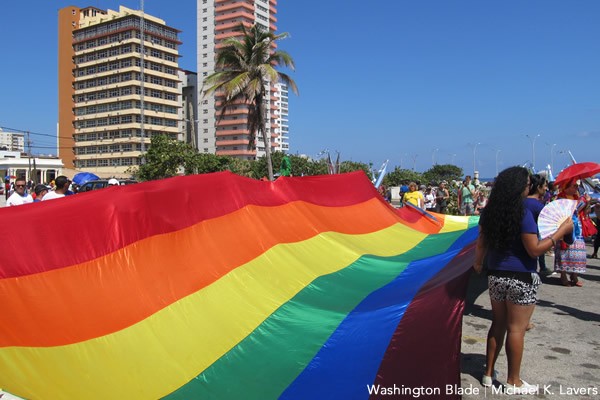
BLADE: In what way has the forced exile that you have faced in Spain changed your work?
PEREA: Right now I continue to do what I want to do, regardless of being in Spain. I still feel that I am in Cuba. My vision as an artist has not changed much. I’ve only been here a year and seven months, although I believe that wherever I am, in some way my work will be linked to that of the island because I have not yet cut that umbilical cord that links me to the place where I was born and took my first steps. It is true that one acquires other mechanisms of creation and invoicing in the work while abroad, but at the moment I do not think that the focus of my work has changed much because of being in another country. Of course, here in Europe there are other problems that I may be able to take advantage of, but be that as it may, they will be appreciated from the perspective of an exiled Latin American artist.
BLADE: On a personal level, what has it been like to be a gay immigrant in Europe?
PEREA: I am very grateful for Spain, mainly for Madrid, which is the place where I have lived since I arrived in 2019. At the moment, I have not felt discriminated against because of my sexual orientation or because I am a foreigner. I have received emotional and legal support from the NGO Rescate, which welcomed me and where I have received the care that I never had in my own country. With all the social and political problems that may exist, it is in this country where I have somehow been able to know what true freedom is.
BLADE: What can we expect from Nonardo Perea in the near future?
PEREA: I am in another difficult moment in my life right now, because I cannot find a job, and I do not receive any money for my artistic work, so what I do is for the love of art and because I cannot stop building my own world. The COVID situation has managed to make things more difficult, not only for me but for everyone, but taking into account that I am an exile and that I have been here for a short time, it is very complicated. Even so, I eventually continue to make video art for the Vulgarmente Clásica audiovisual project, which I have been doing for several years. And more recently I started with a new project, “Maricón Tropical: Living in Madrid”, this one is a bit more comprehensive not to call it ambitious because I insert various artistic manifestations: Performance, audiovisual, literature, drawing and photography, and it is focused on my new life as an exile in Madrid, everything seen from a self-referential point of view, as are almost all my proposals.
BLADE: If you had to create a work that describes your life right now, what would it be like?
PEREA: I consider that my life, my true life, has started now, what it was before was not. For the purposes I was born on March 19, 2019, when I set foot in Spain. All the past is left behind. I want to imagine that the past was a bad dream. My “Maricón Tropical: Living in Madrid” project is a work that somehow reflects that past, which is unfortunately impossible to forget and it is also good that people know what that other life was like, but I focus more on the present, my current problems as a person who faces a new life as an adult who feels like a newborn. I can only tell you that my life’s work is in progress.
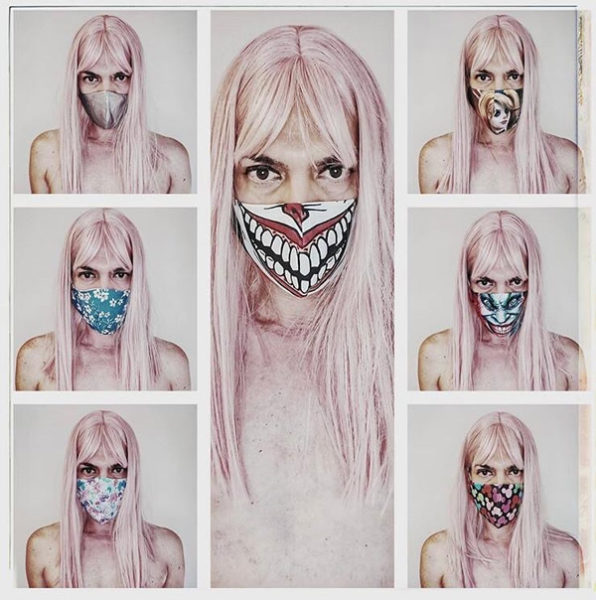
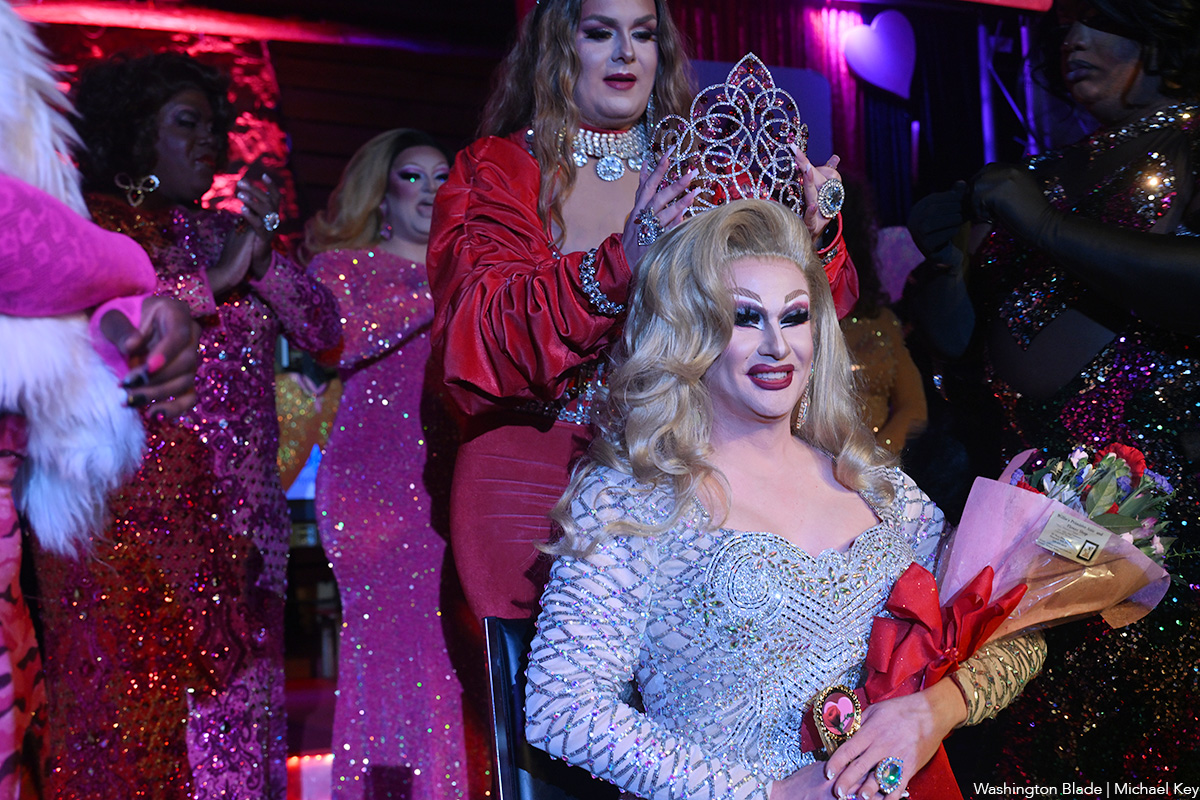
The 44th annual Queen of Hearts pageant was held at The Lodge in Boonsboro, Md. on Friday, Feb. 20. Six contestants vied for the title and Bev was crowned the winner.
(Washington Blade photos by Michael Key)
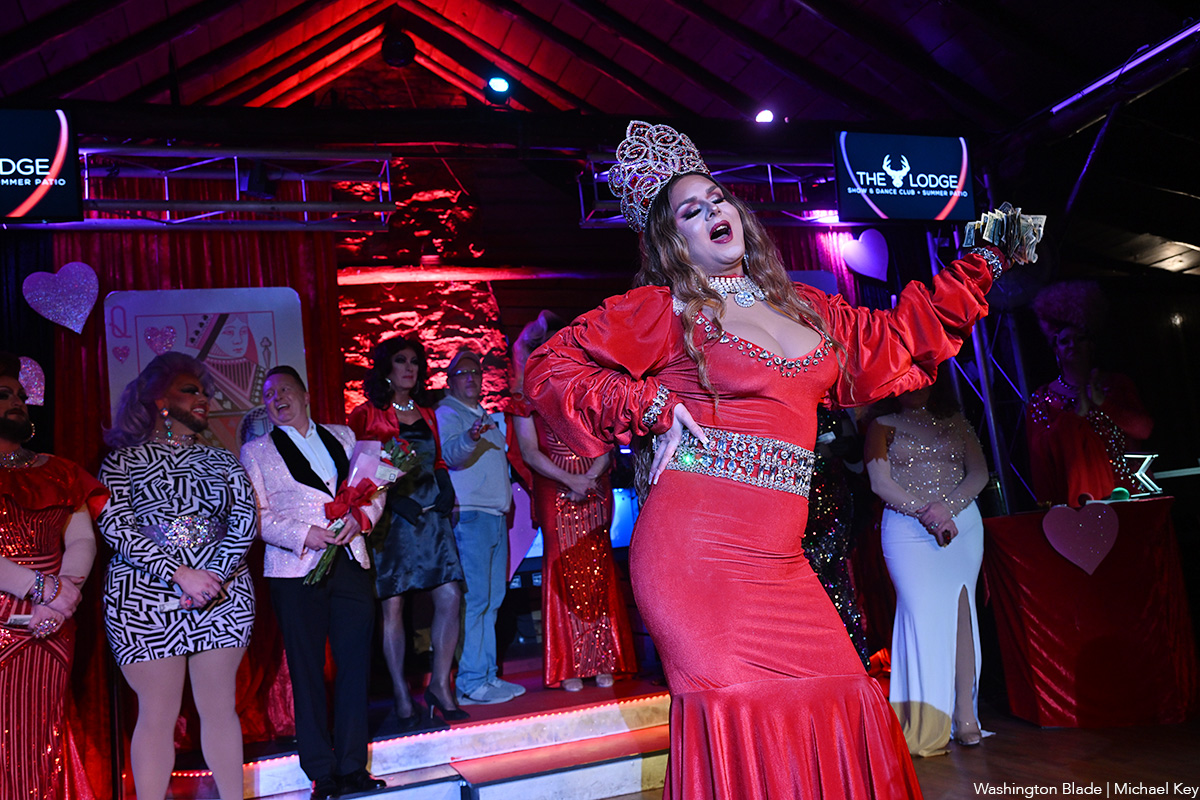
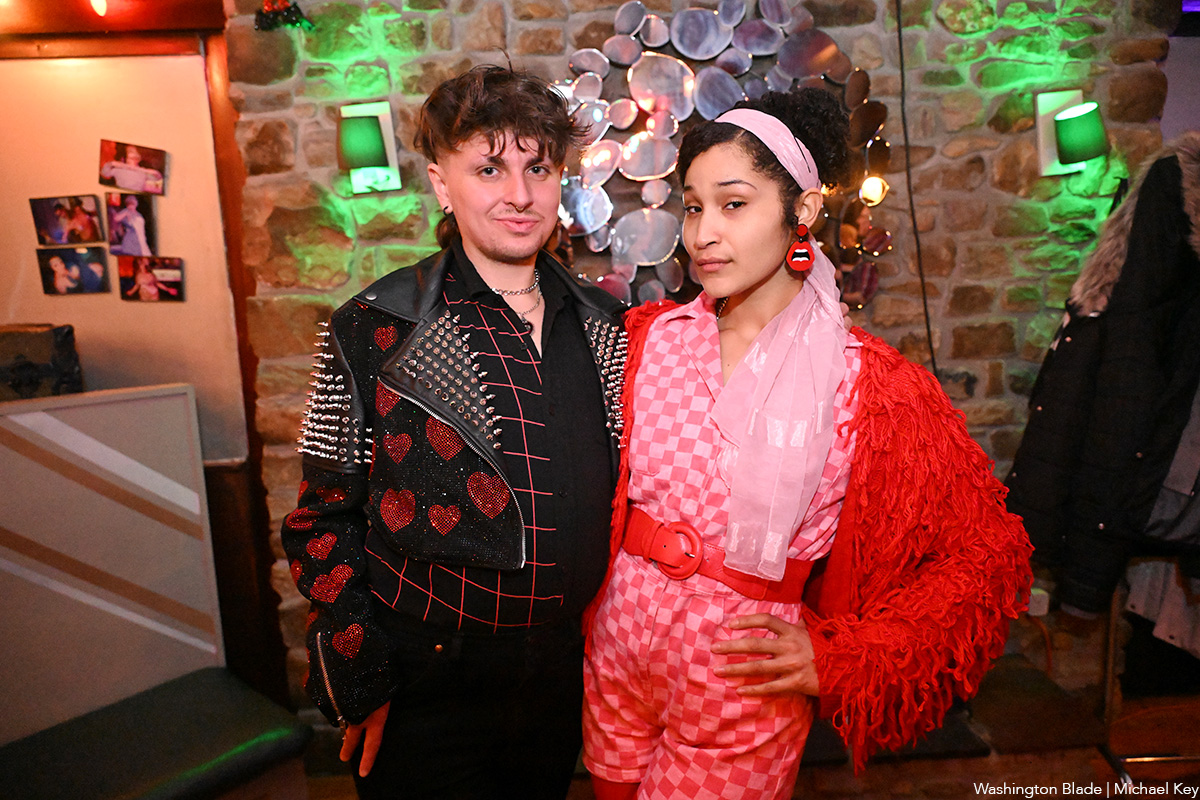
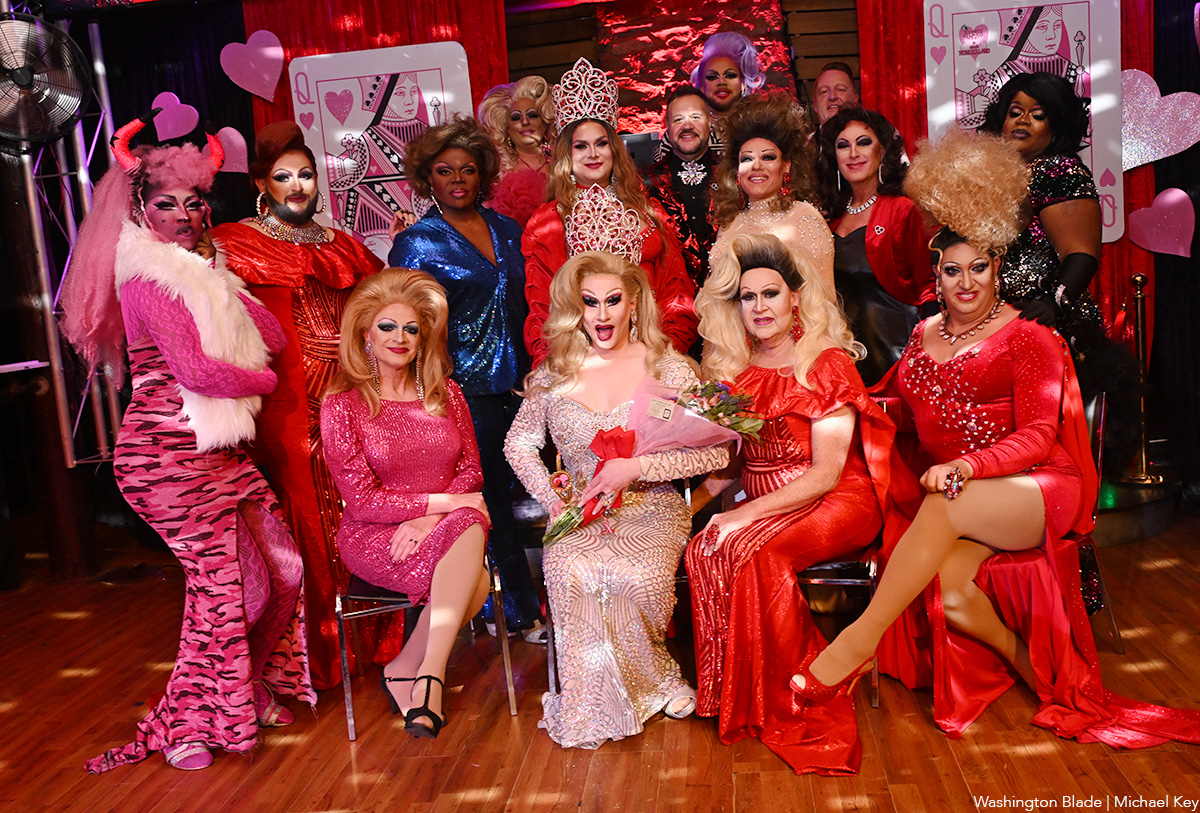
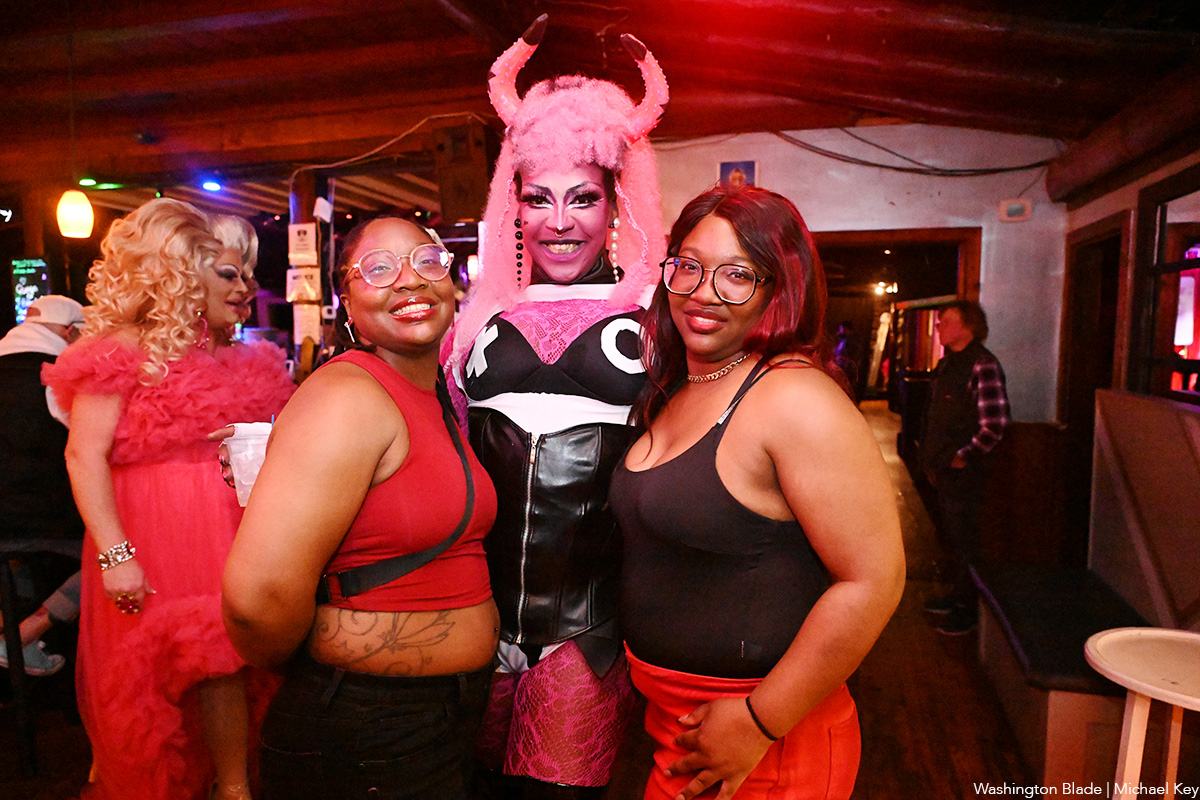
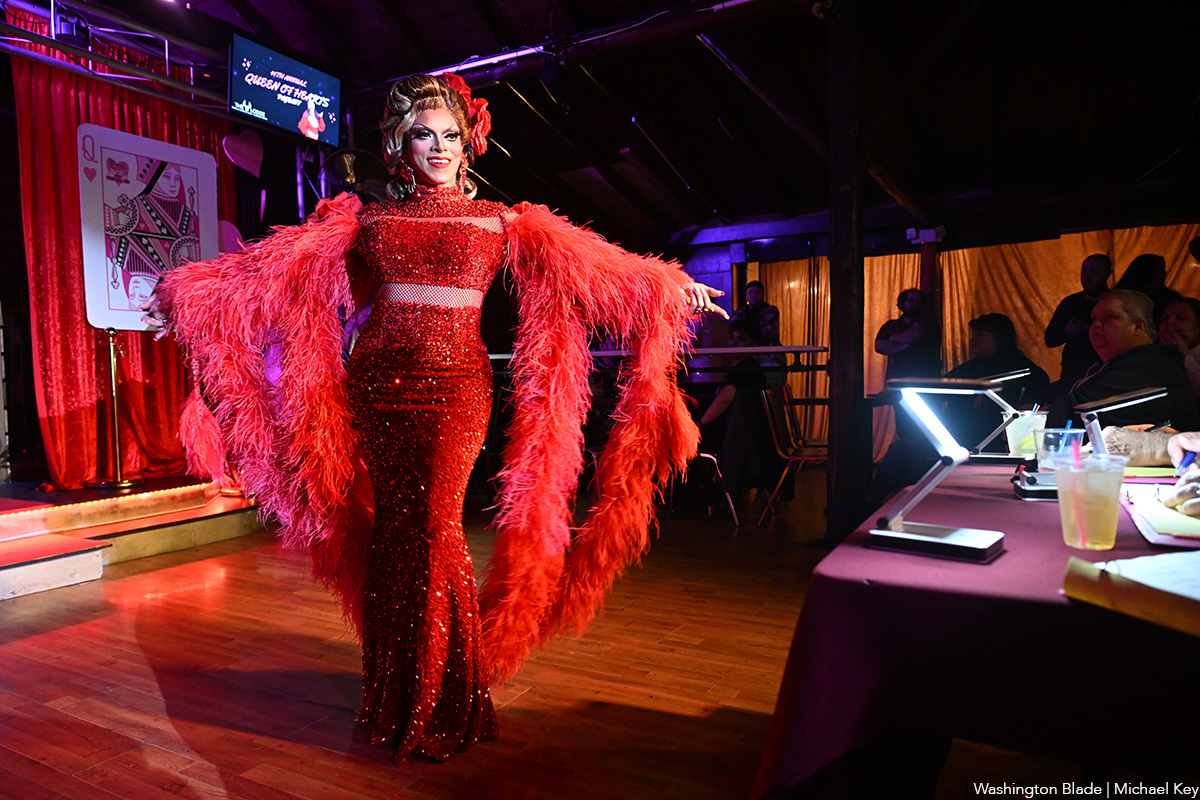
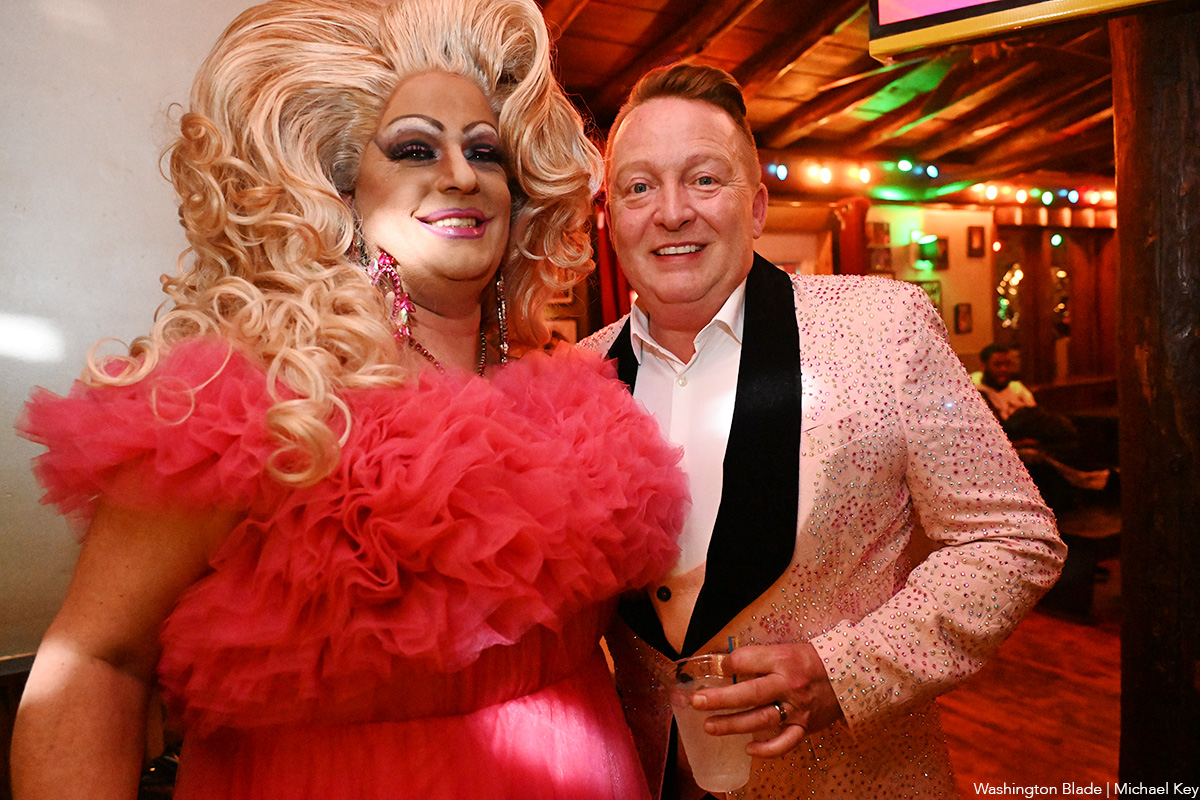
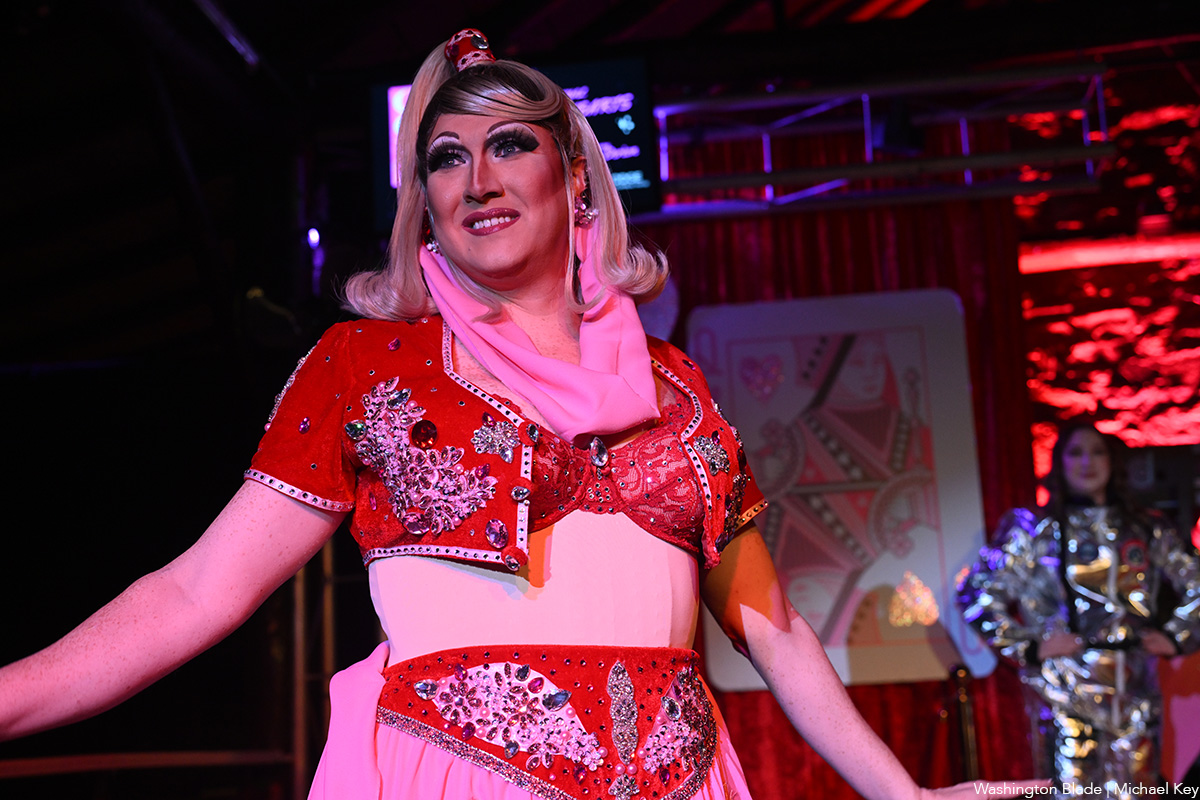
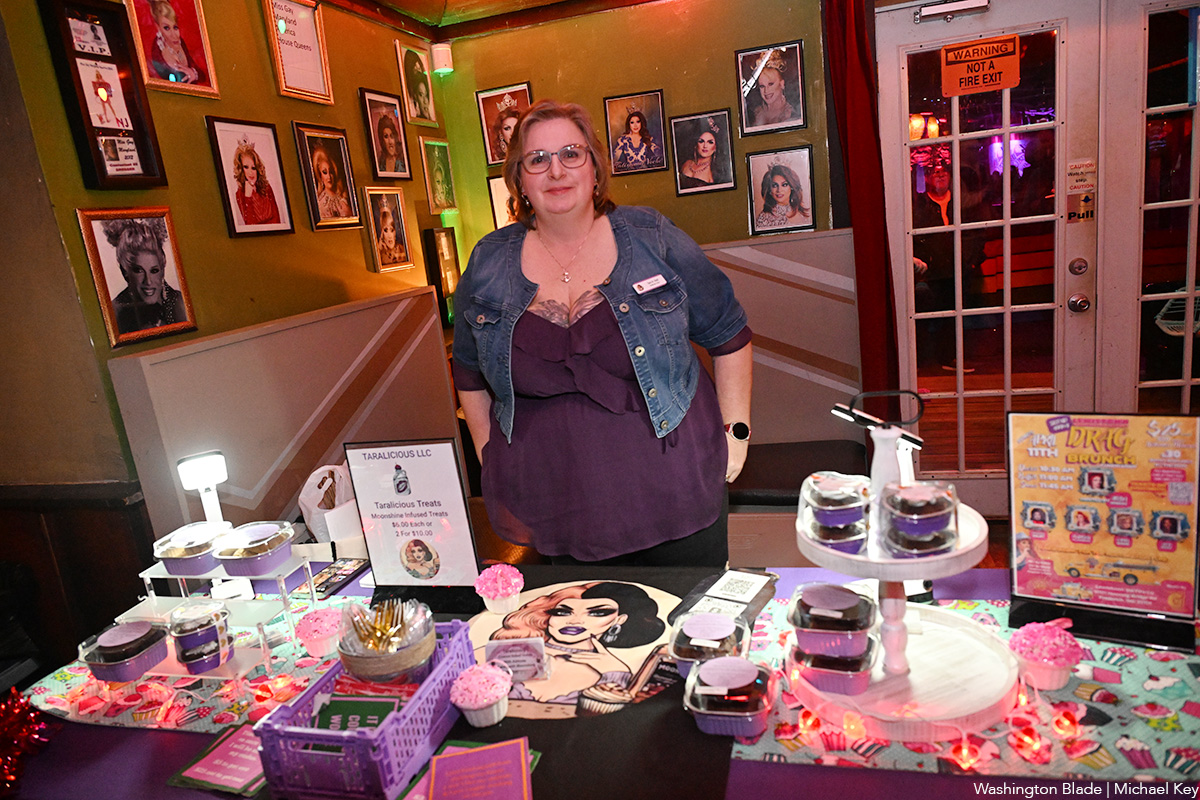
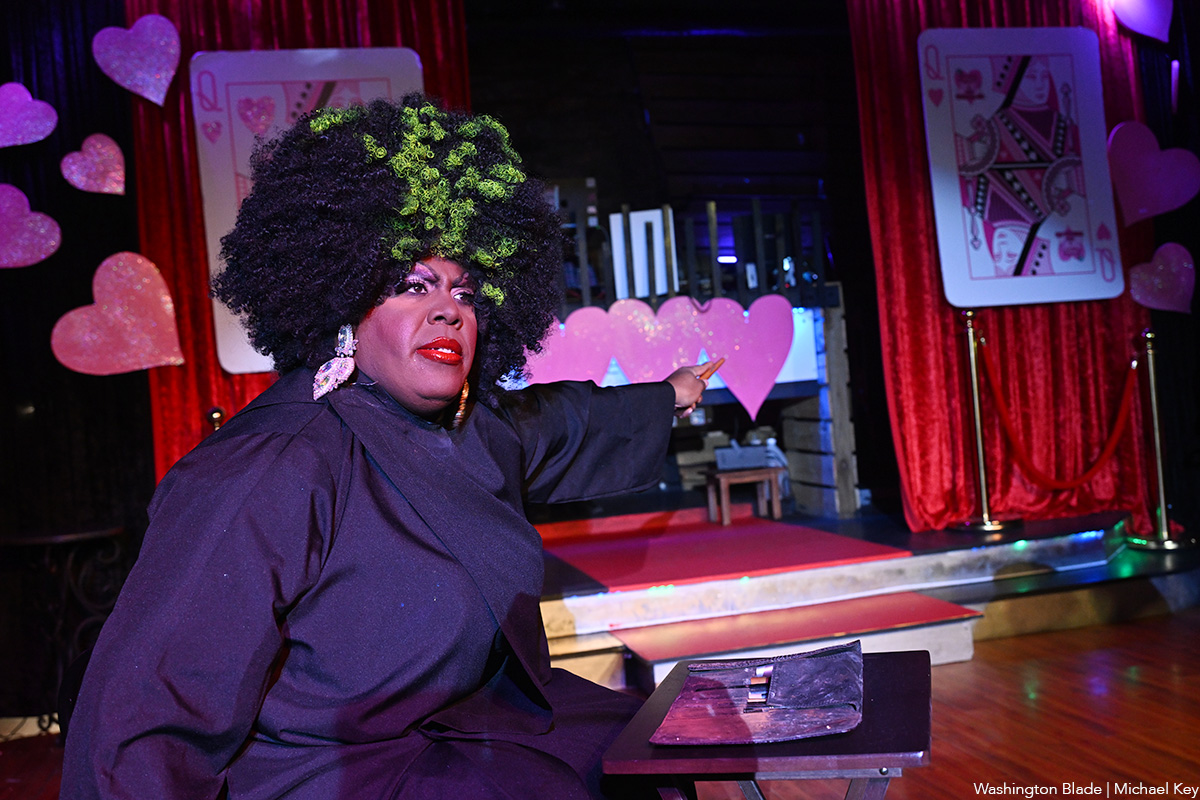
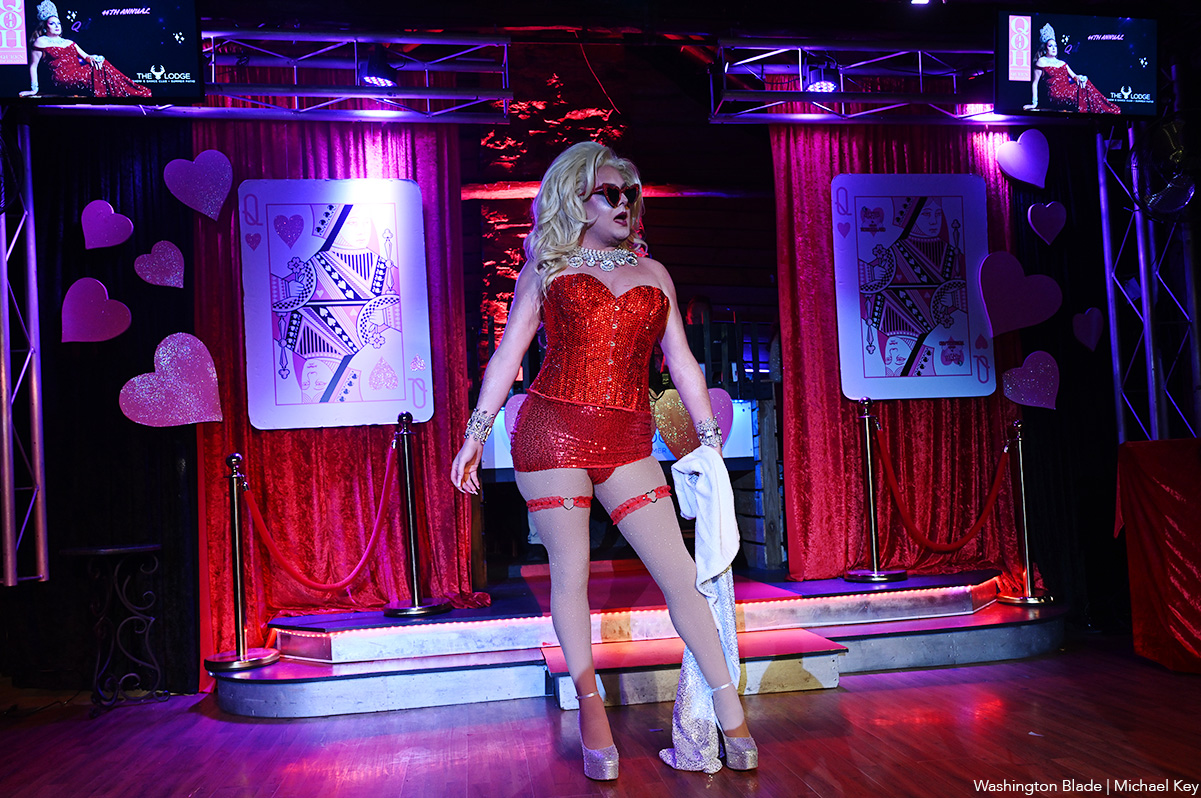
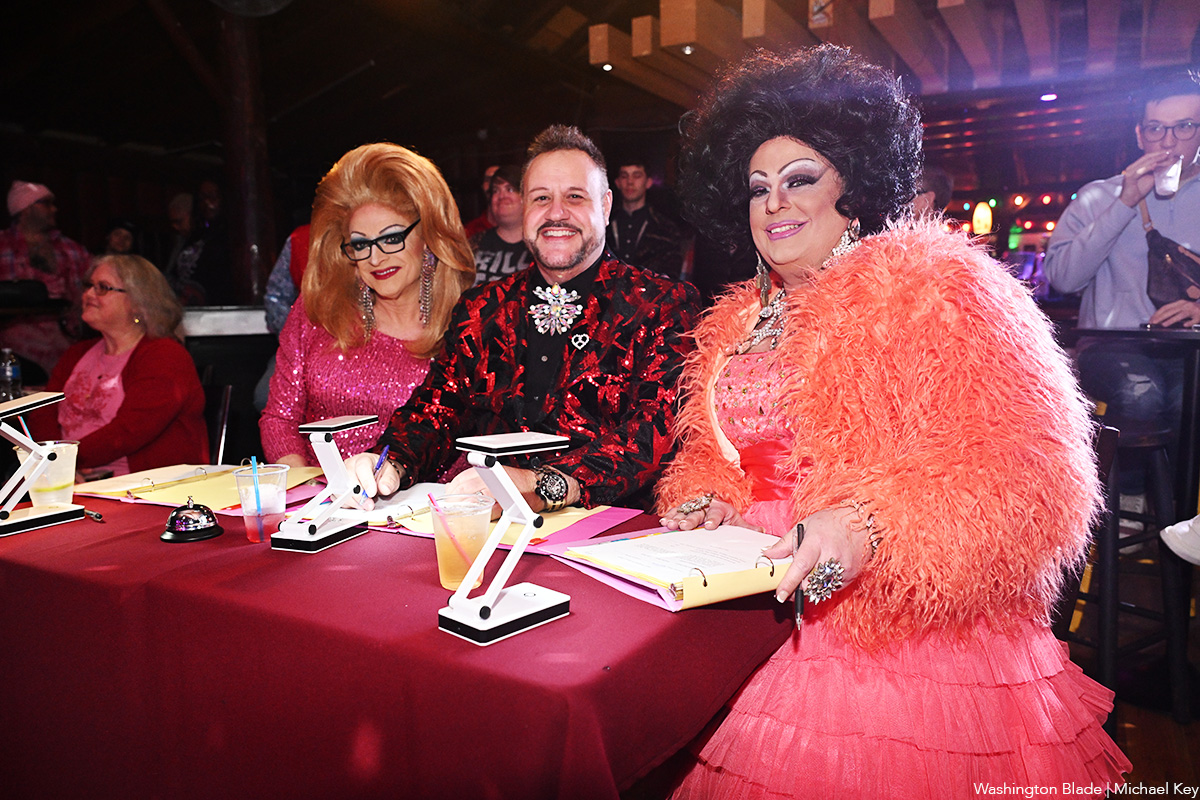
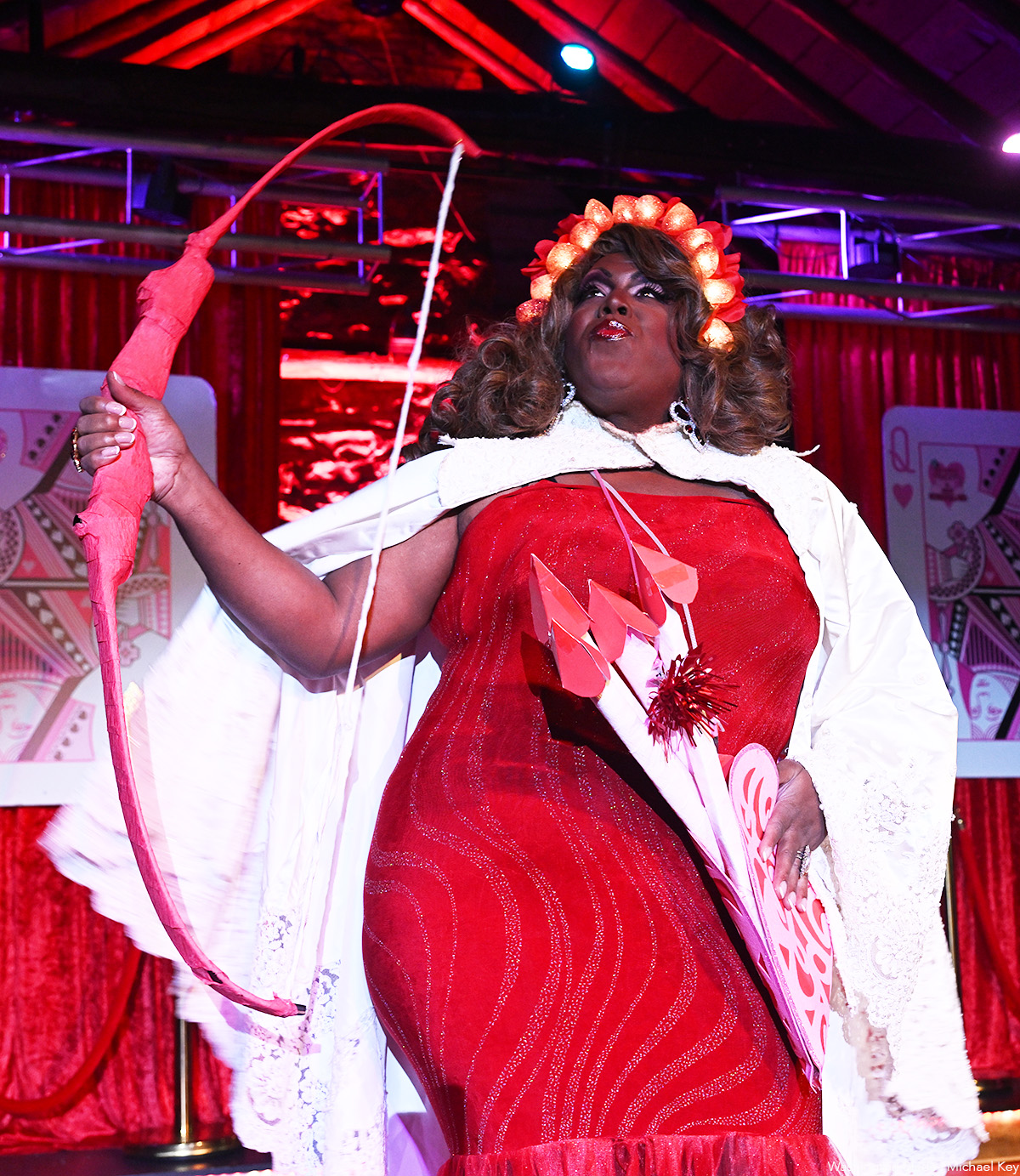
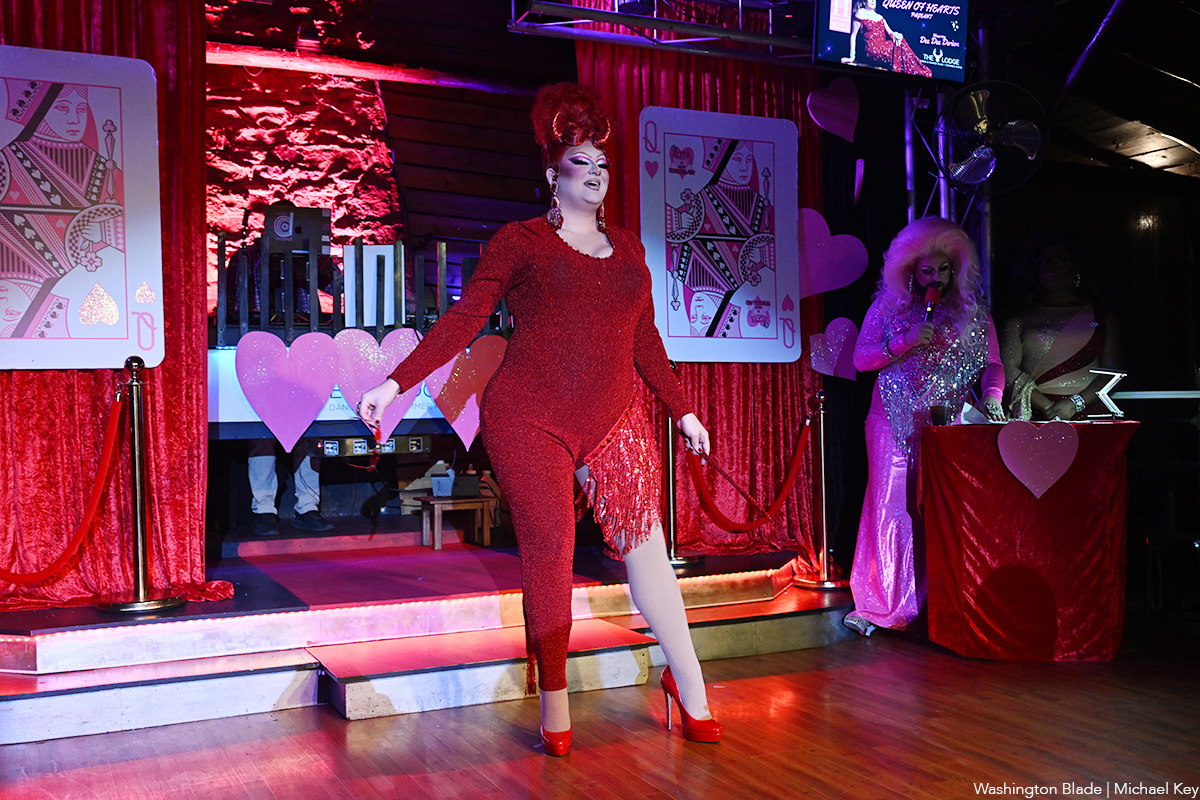
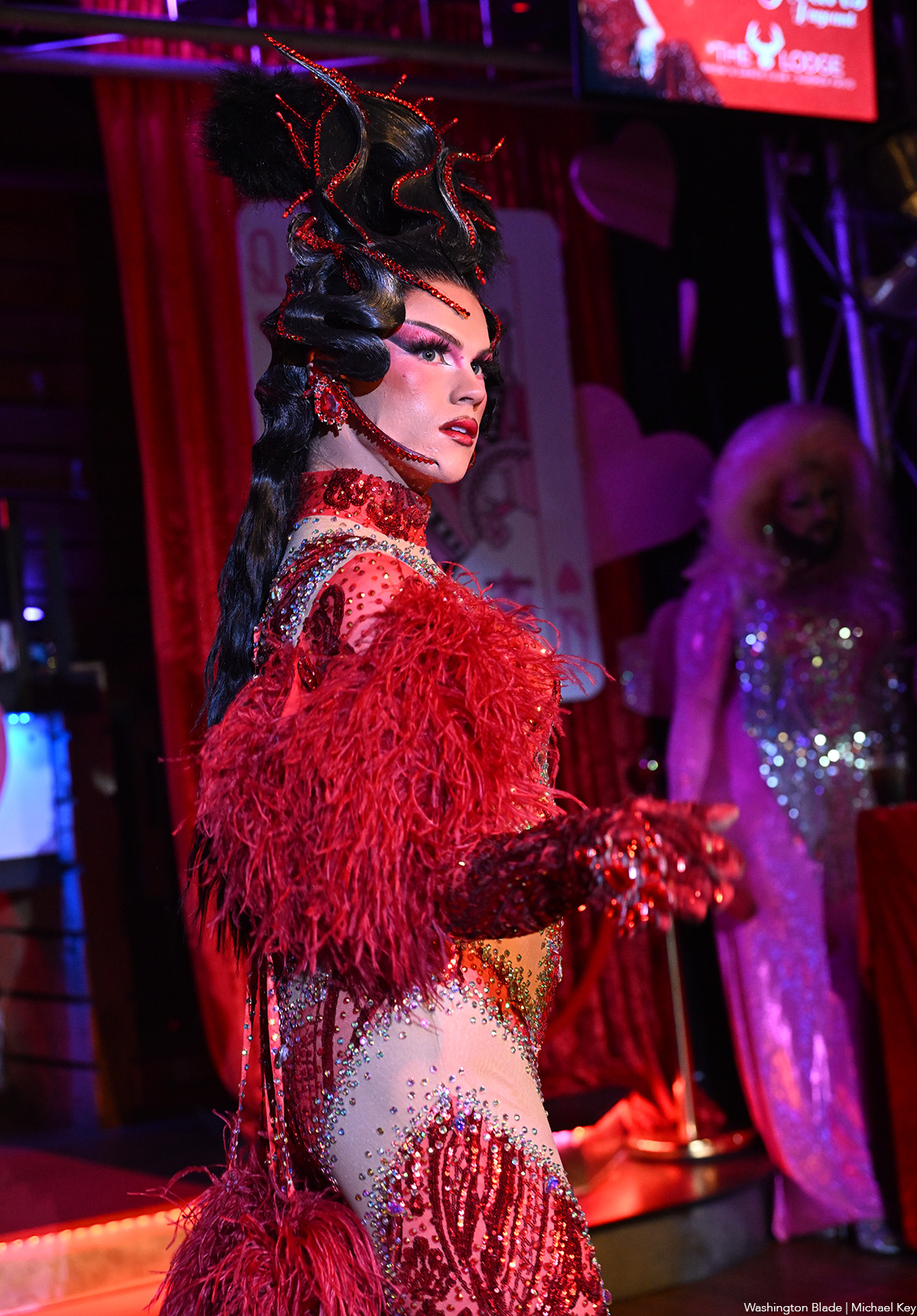
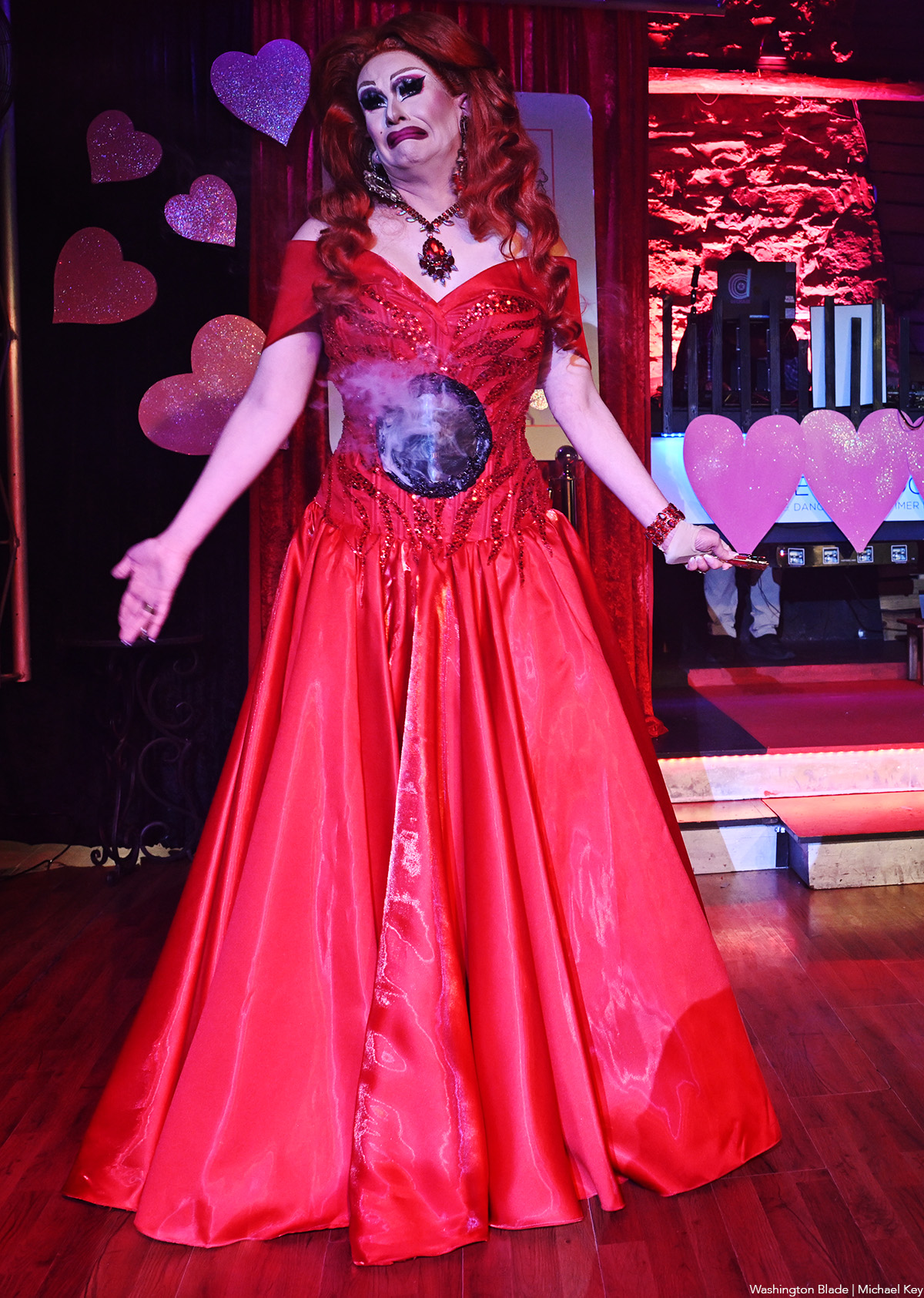
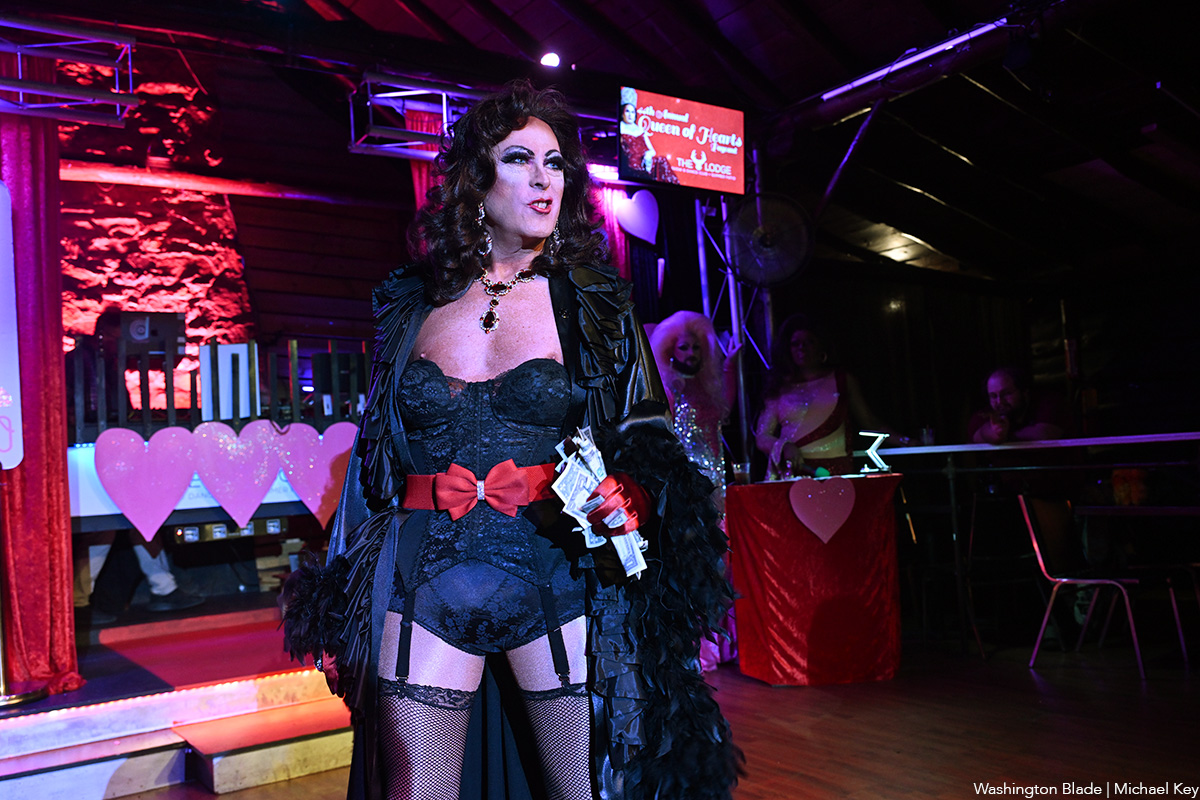
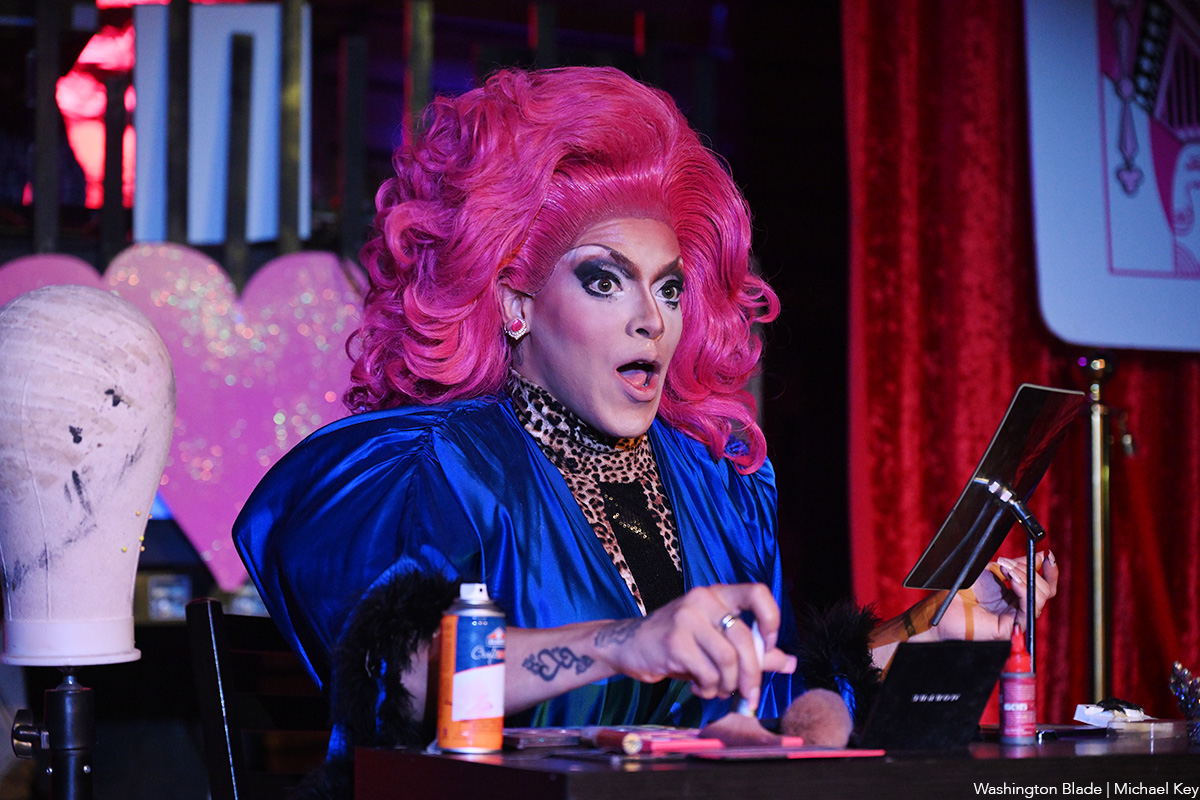
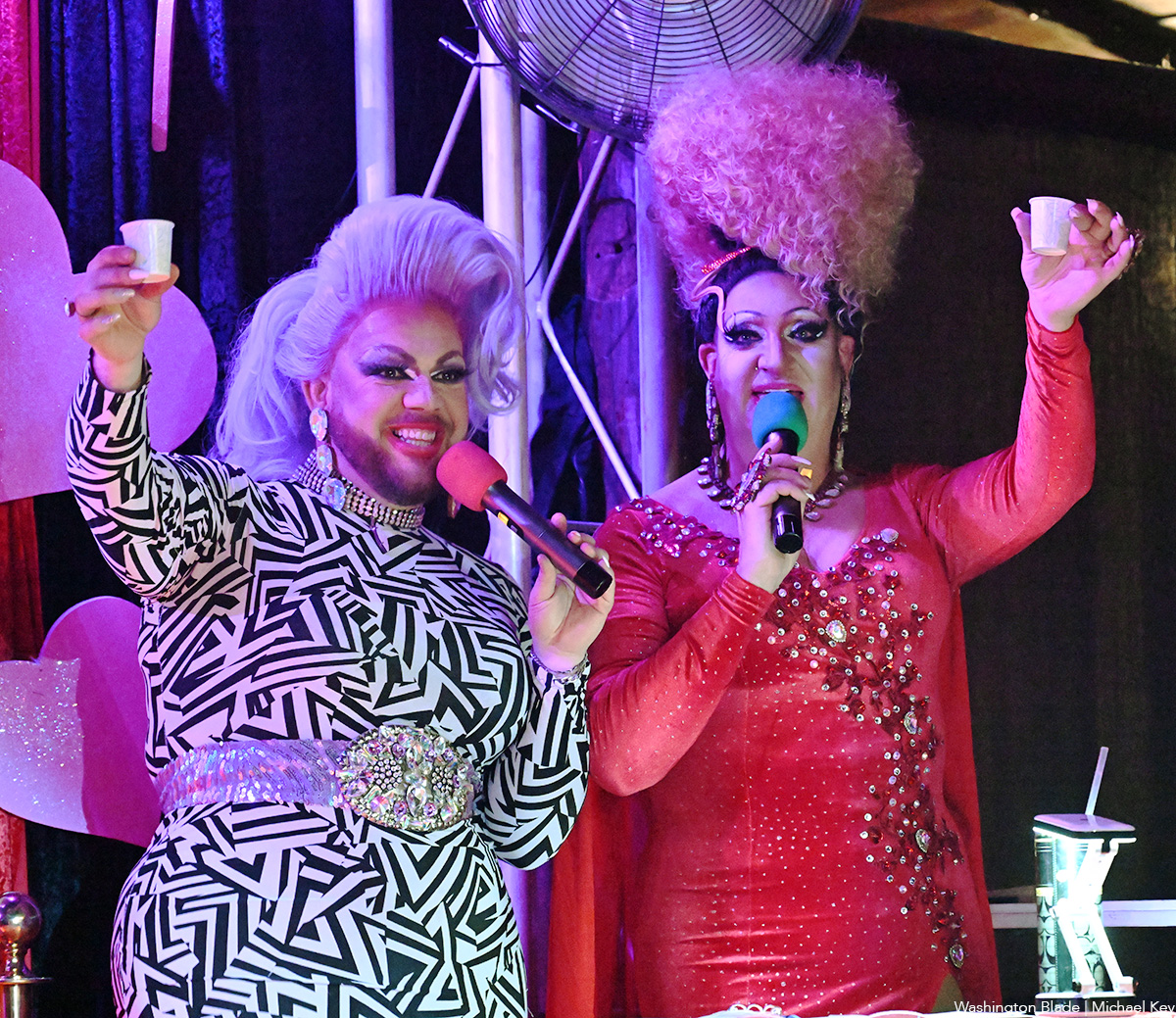
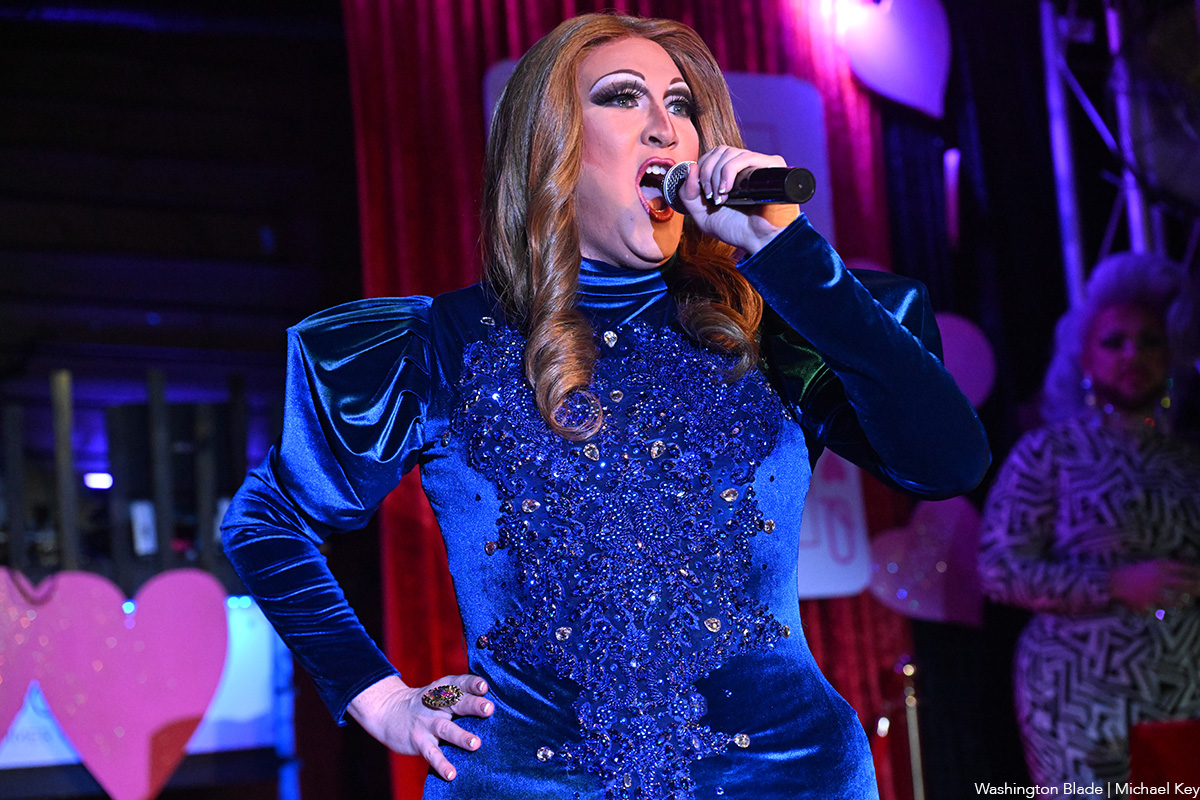
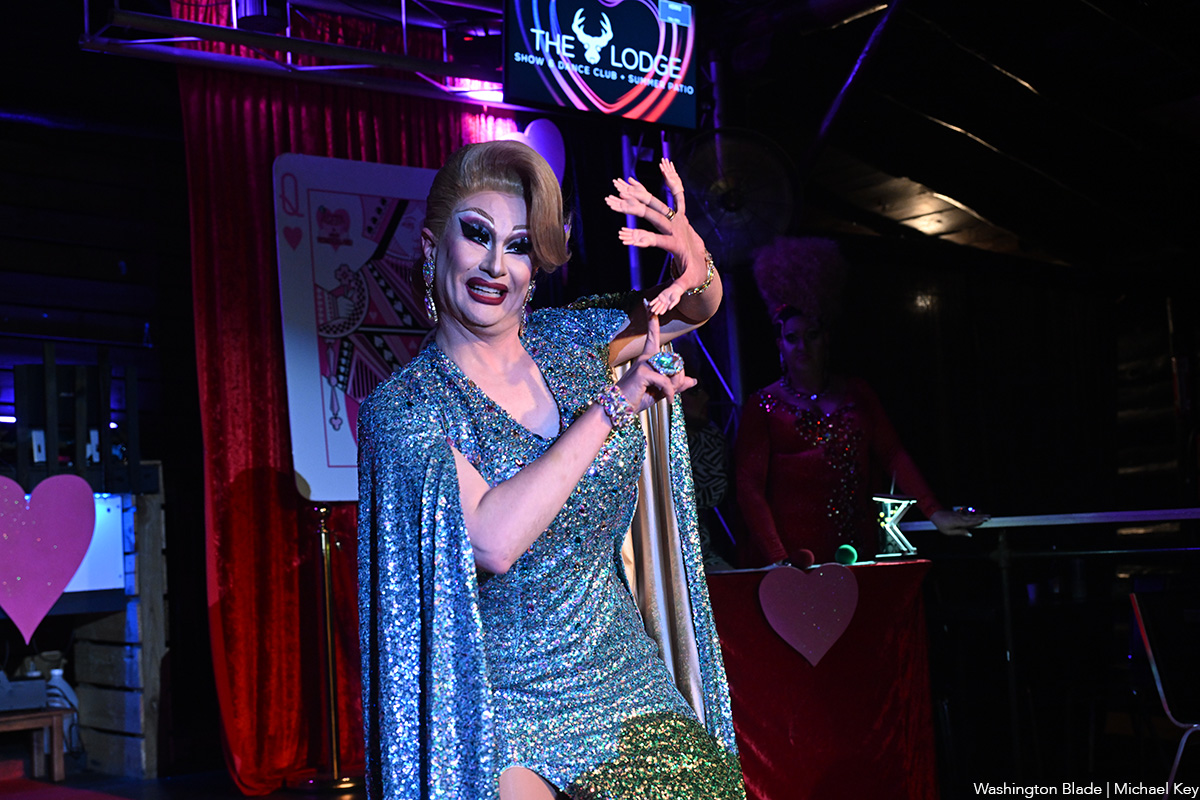
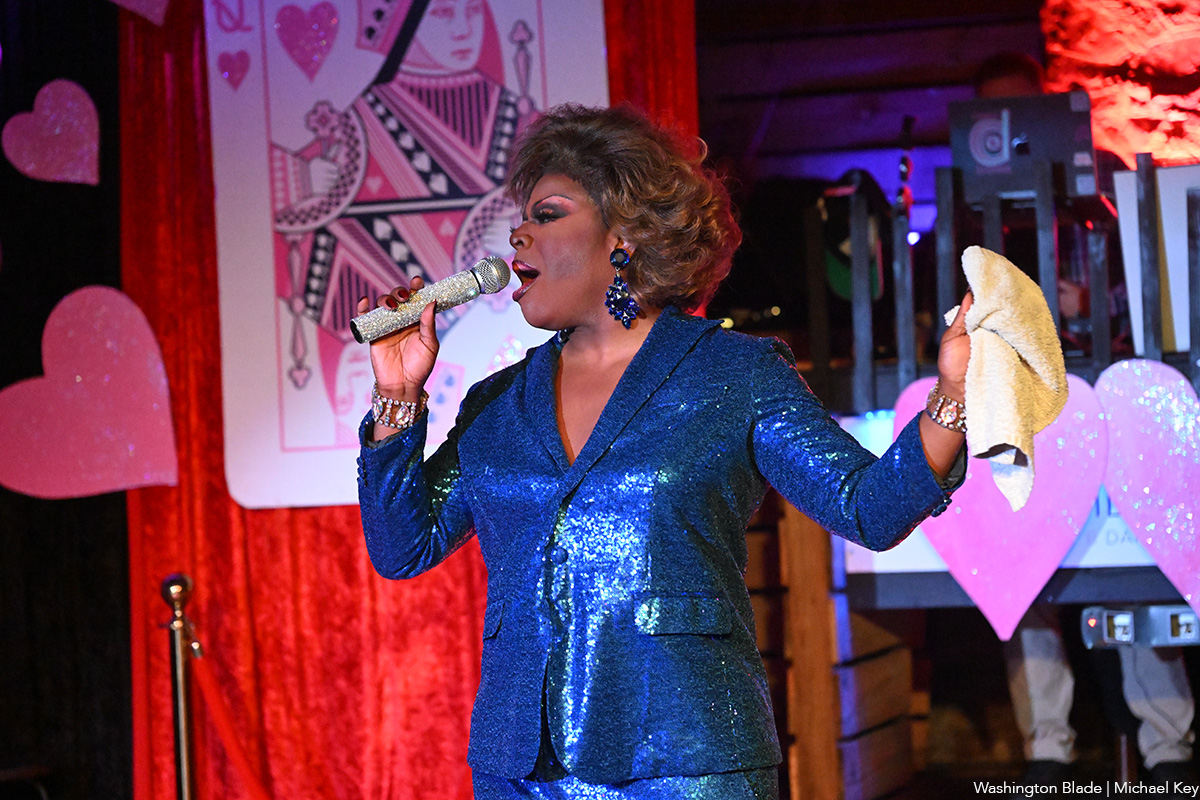
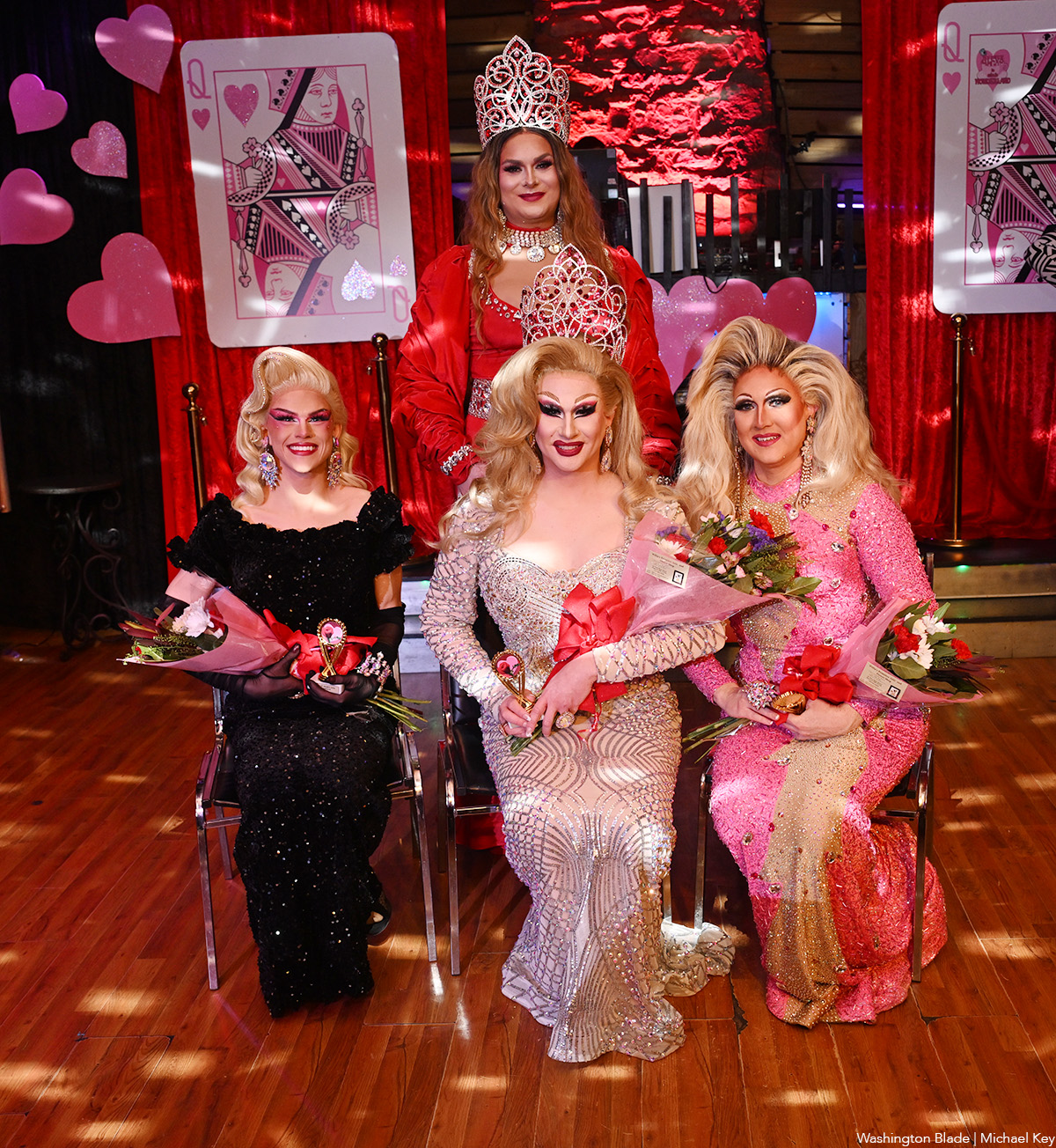
View on Threads
Books
New book profiles LGBTQ Ukrainians, documents war experiences
Tuesday marks four years since Russia attacked Ukraine

Journalist J. Lester Feder’s new book profiles LGBTQ Ukrainians and their experiences during Russia’s war against their country.
Feder for “The Queer Face of War: Portraits and Stories from Ukraine” interviewed and photographed LGBTQ Ukrainians in Kyiv, the country’s capital, and in other cities. They include Olena Hloba, the co-founder of Tergo, a support group for parents and friends of LGBTQ Ukrainians, who fled her home in the Kyiv suburb of Bucha shortly after Russia launched its war on Feb. 24, 2022.
Russian soldiers killed civilians as they withdrew from Bucha. Videos and photographs that emerged from the Kyiv suburb showed dead bodies with their hands tied behind their back and other signs of torture.

Olena Shevchenko, chair of Insight, a Ukrainian LGBTQ rights group, wrote the book’s forward.

The book also profiles Viktor Pylypenko, a gay man who the Ukrainian military assigned to the 72nd Mechanized Black Cossack Brigade after the war began. Feder writes Pylypenko’s unit “was deployed to some of the fiercest and most important battles of the war.”
“The brigade was pivotal to beating Russian forces back from Kyiv in their initial attempt to take the capital, helping them liberate territory near Kharkiv and defending the front lines in Donbas,” wrote Feder.
Pylypenko spent two years fighting “on Ukraine’s most dangerous battlefields, serving primarily as a medic.”
“At times he felt he was living in a horror movie, watching tank shells tear his fellow soldiers apart before his eyes,” wrote Feder. “He held many men as they took their final breaths. Of the roughly one hundred who entered the unit with him, only six remained when he was discharged in 2024. He didn’t leave by choice: he went home to take care of his father, who had suffered a stroke.”
Feder notes one of Pylypenko’s former commanders attacked him online when he came out. Pylypenko said another commander defended him.
Feder also profiled Diana and Oleksii Polukhin, two residents of Kherson, a port city in southern Ukraine that is near the mouth of the Dnieper River.
Ukrainian forces regained control of Kherson in November 2022, nine months after Russia occupied it.
Diana, a cigarette vender, and Polukhin told Feder that Russian forces demanded they disclose the names of other LGBTQ Ukrainians in Kherson. Russian forces also tortured Diana and Polukhin while in their custody.
Polukhim is the first LGBTQ victim of Russian persecution to report their case to Ukrainian prosecutors.

Feder, who is of Ukrainian descent, first visited Ukraine in 2013 when he wrote for BuzzFeed.
He was Outright International’s Senior Fellow for Emergency Research from 2021-2023. Feder last traveled to Ukraine in December 2024.
Feder spoke about his book at Politics and Prose at the Wharf in Southwest D.C. on Feb. 6. The Washington Blade spoke with Feder on Feb. 20.
Feder told the Blade he began to work on the book when he was at Outright International and working with humanitarian groups on how to better serve LGBTQ Ukrainians. Feder said military service requirements, a lack of access to hormone therapy and documents that accurately reflect a person’s gender identity and LGBTQ-friendly shelters are among the myriad challenges that LGBTQ Ukrainians have faced since the war began.
“All of these were components of a queer experience of war that was not well documented, and we had never seen in one place, especially with photos,” he told the Blade. “I felt really called to do that, not only because of what was happening in Ukraine, but also as a way to bring to the surface issues that we’d had seen in Iraq and Syria and Afghanistan.”

Feder also spoke with the Blade about the war’s geopolitical implications.
Russian President Vladimir Putin in 2013 signed a law that bans the “promotion of homosexuality” to minors.
The 2014 Winter Olympics took place in Sochi, a Russian resort city on the Black Sea. Russia annexed Crimea from Ukraine a few weeks after the games ended.
Russia’s anti-LGBTQ crackdown has continued over the last decade.
The Russian Supreme Court in 2023 ruled the “international LGBT movement” is an extremist organization and banned it. The Russian Justice Ministry last month designated ILGA World, a global LGBTQ and intersex rights group, as an “undesirable” organization.
Ukraine, meanwhile, has sought to align itself with Europe.
Ukrainian President Volodymyr Zelenskyy after a 2021 meeting with then-President Joe Biden at the White House said his country would continue to fight discrimination based on sexual orientation and gender identity. (Zelenskyy’s relationship with the U.S. has grown more tense since the Trump-Vance administration took office.) Zelenskyy in 2022 publicly backed civil partnerships for same-sex couples.
Then-Ukrainian Ambassador to the U.S. Oksana Markarova in 2023 applauded Kyiv Pride and other LGBTQ and intersex rights groups in her country when she spoke at a photo exhibit at Ukraine House in D.C. that highlighted LGBTQ and intersex soldiers. Then-Kyiv Pride Executive Director Lenny Emson, who Feder profiles in his book, was among those who attended the event.
“Thank you for everything you do in Kyiv, and thank you for everything that you do in order to fight the discrimination that still is somewhere in Ukraine,” said Markarova. “Not everything is perfect yet, but you know, I think we are moving in the right direction. And we together will not only fight the external enemy, but also will see equality.”
Feder in response to the Blade’s question about why he decided to write his book said he “didn’t feel” the “significance of Russia’s war against Ukraine” for LGBTQ people around the world “was fully understood.”
“This was an opportunity to tell that big story,” he said.
“The crackdown on LGBT rights inside Russia was essentially a laboratory for a strategy of attacking democratic values by attacking queer rights and it was one as Ukraine was getting closet to Europe back in 2013, 2014,” he added. “It was a strategy they were using as part of their foreign policy, and it was one they were using not only in Ukraine over the past decade, but around the world.”
Feder said Republicans are using “that same strategy to attack queer people, to attack democracy itself.”
“I felt like it was important that Americans understand that history,” he said.

More than a dozen LGBTQ athletes won medals at the Milan Cortina Winter Olympics that ended on Sunday.
Cayla Barnes, Hilary Knight, and Alex Carpenter are LGBTQ members of the U.S. women’s hockey team that won a gold medal after they defeated Canada in overtime. Knight the day before the Feb. 19 match proposed to her girlfriend, Brittany Bowe, an Olympic speed skater.
French ice dancer Guillaume Cizeron, who is gay, and his partner Laurence Fournier Beaudry won gold. American alpine skier Breezy Johnson, who is bisexual, won gold in the women’s downhill. Amber Glenn, who identifies as bisexual and pansexual, was part of the American figure skating team that won gold in the team event.
Swiss freestyle skier Mathilde Gremaud, who is in a relationship with Vali Höll, an Austrian mountain biker, won gold in women’s freeski slopestyle.
Bruce Mouat, who is the captain of the British curling team that won a silver medal, is gay. Six members of the Canadian women’s hockey team — Emily Clark, Erin Ambrose, Emerance Maschmeyer, Brianne Jenner, Laura Stacey, and Marie-Philip Poulin — that won silver are LGBTQ.
Swedish freestyle skier Sandra Naeslund, who is a lesbian, won a bronze medal in ski cross.
Belgian speed skater Tineke den Dulk, who is bisexual, was part of her country’s mixed 2000-meter relay that won bronze. Canadian ice dancer Paul Poirier, who is gay, and his partner, Piper Gilles, won bronze.
Laura Zimmermann, who is queer, is a member of the Swiss women’s hockey team that won bronze when they defeated Sweden.
Outsports.com notes all of the LGBTQ Olympians who competed at the games and who medaled.





